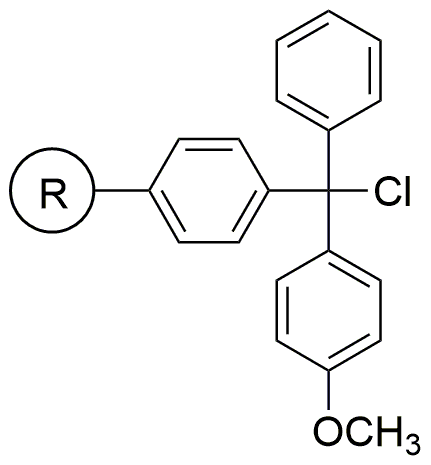4-Methoxytrityl chloride resin is widely utilized in research focused on
- Solid-Phase Peptide Synthesis: This resin serves as a key support in the synthesis of peptides, allowing for efficient coupling and deprotection steps, which streamlines the overall process.
- Nucleic Acid Synthesis: It is employed in the preparation of oligonucleotides, facilitating the attachment of nucleotides while ensuring high purity and yield.
- Drug Development: Researchers use this resin to create complex molecules that can lead to the discovery of new pharmaceuticals, enhancing the efficiency of drug design.
- Bioconjugation: The resin is valuable in attaching biomolecules to surfaces or other molecules, which is crucial in developing targeted therapies and diagnostics.
- Analytical Chemistry: It aids in the purification and analysis of compounds, providing a reliable method for isolating desired products from complex mixtures.
General Information
Properties
Safety and Regulations
Applications
4-Methoxytrityl chloride resin is widely utilized in research focused on
- Solid-Phase Peptide Synthesis: This resin serves as a key support in the synthesis of peptides, allowing for efficient coupling and deprotection steps, which streamlines the overall process.
- Nucleic Acid Synthesis: It is employed in the preparation of oligonucleotides, facilitating the attachment of nucleotides while ensuring high purity and yield.
- Drug Development: Researchers use this resin to create complex molecules that can lead to the discovery of new pharmaceuticals, enhancing the efficiency of drug design.
- Bioconjugation: The resin is valuable in attaching biomolecules to surfaces or other molecules, which is crucial in developing targeted therapies and diagnostics.
- Analytical Chemistry: It aids in the purification and analysis of compounds, providing a reliable method for isolating desired products from complex mixtures.
Documents
Safety Data Sheets (SDS)
The SDS provides comprehensive safety information on handling, storage, and disposal of the product.
Product Specification (PS)
The PS provides a comprehensive breakdown of the product’s properties, including chemical composition, physical state, purity, and storage requirements. It also details acceptable quality ranges and the product's intended applications.
Certificates of Analysis (COA)
Search for Certificates of Analysis (COA) by entering the products Lot Number. Lot and Batch Numbers can be found on a product’s label following the words ‘Lot’ or ‘Batch’.
*Catalog Number
*Lot Number
Certificates Of Origin (COO)
This COO confirms the country where the product was manufactured, and also details the materials and components used in it and whether it is derived from natural, synthetic, or other specific sources. This certificate may be required for customs, trade, and regulatory compliance.
*Catalog Number
*Lot Number
Safety Data Sheets (SDS)
The SDS provides comprehensive safety information on handling, storage, and disposal of the product.
DownloadProduct Specification (PS)
The PS provides a comprehensive breakdown of the product’s properties, including chemical composition, physical state, purity, and storage requirements. It also details acceptable quality ranges and the product's intended applications.
DownloadCertificates of Analysis (COA)
Search for Certificates of Analysis (COA) by entering the products Lot Number. Lot and Batch Numbers can be found on a product’s label following the words ‘Lot’ or ‘Batch’.
*Catalog Number
*Lot Number
Certificates Of Origin (COO)
This COO confirms the country where the product was manufactured, and also details the materials and components used in it and whether it is derived from natural, synthetic, or other specific sources. This certificate may be required for customs, trade, and regulatory compliance.


